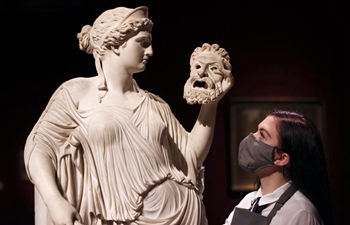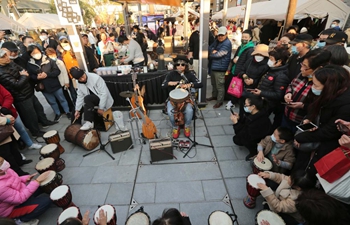ROME, March 11 (Xinhua) -- A total of 10,590 coronavirus infections were registered in Italy on Wednesday, up from 8,514 in the previous day, the Civil Protection Department stated.
The figure marked an increase of 2,076 new cases against the previous day, and did not include recoveries or fatalities.
Authorities explained such relevant increase was partially due to some 600 people who had tested positive already on Tuesday (in Lombardy), whose data had not yet been processed.
"The number of people who have recovered has increased by 41 compared to Tuesday, bringing the total to 1,045," Civil Protection Department chief and extraordinary commissioner for the coronavirus emergency Angelo Borrelli told a televised press conference.
In the day, 196 new fatalities were also recorded, bringing the death toll to 827 since the epidemic first appeared in Italy on Feb. 21. By far, a total of 12,462 accumulated COVID-19 cases have been reported in the country.
"About two percent of the deceased were aged between 50 and 60, and all the remaining cases were of people older than that," the commissioner told reporters.
"I also confirm over 78 percent of those who have died had underlying pathologies," he specified.
As for the 10,590 people positive for the COVID-19, some 5,838 of them were currently in hospital with symptoms, 1,028 were in intensive care units, and 3,724 under house quarantine because of asymptomatic or with light symptoms.
The whole country is under lockdown due to the coronavirus emergency since Tuesday, which will last until April 3.
Prime Minister Giuseppe Conte's government took the unprecedented measure to extend containment measures earlier enforced in the northern regions to the entire Italian territory after a substantial increase in infections and fatalities late last week.
The decree enforcing the decision banned all cultural, leisure, religious, sporting events, and all public gatherings, and forbade personal movement of people also within the cities, except for strict work reasons, family needs (such as assisting elders and not self-sufficient relatives), and health issues.
It also closed down pubs, museums, theatres, schools and universities, ski facilities, gyms, and swimming pools.











